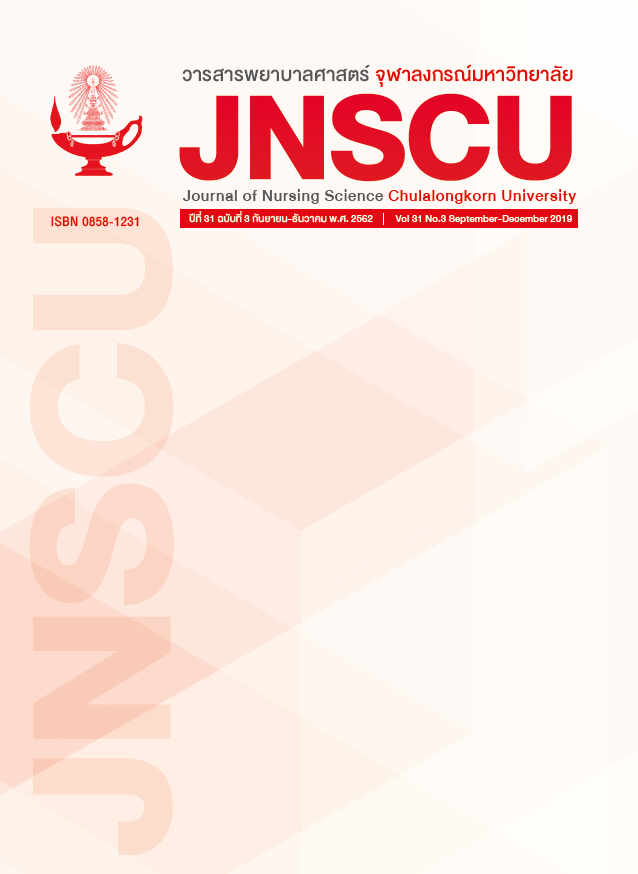ผลของโปรแกรมเสริมสร้างความสามารถในการดูแลของครอบครัวต่ออาการออทิสติกของเด็กออทิสติกวัยก่อนเรียน
คำสำคัญ:
ความสามารถในการดูแล, ครอบครัว, อาการออทิสติก, เด็กออทิสติกวัยก่อนเรียนบทคัดย่อ
วัตถุประสงค์: เพื่อเปรียบเทียบอาการออทิสติกของเด็กออทิสติกวัยก่อนเรียนก่อนและหลังได้รับโปรแกรมเสริมสร้างความสามารถในการดูแลของครอบครัว และเปรียบเทียบอาการออทิสติกของเด็กออทิสติกวัยก่อนเรียนที่ได้รับโปรแกรมเสริมสร้างความสามารถในการดูแลของครอบครัวกับกลุ่มที่ได้รับการพยาบาลตามปกติ
รูปแบบการวิจัย: การวิจัยกึ่งทดลอง
วิธีดำเนินการวิจัย: กลุ่มตัวอย่างคือ เด็กที่ออทิสติกอายุ 3-6 ปี และครอบครัวที่มารับบริการแผนกผู้ป่วยนอก โรงพยาบาลยุวประสาทไวทโยปถัมภ์ ซึ่งมีคุณสมบัติตามเกณฑ์ โดยได้รับการจับคู่ (Matched pair) และการสุ่มเข้ากลุ่มทดลองและกลุ่มควบคุม จำนวนกลุ่มละ 20 คู่ กลุ่มทดลองได้รับการเข้าร่วมโปรแกรมเสริมสร้างความสามารถในการดูแลของครอบครัว เป็นระยะเวลา 4 สัปดาห์ ส่วนกลุ่มควบคุมได้รับการพยาบาลตามปกติ เครื่องมือที่ใช้ในการวิจัย คือ แบบประเมินอาการรุนแรงของโรคออทิซึม แบบประเมินพลังอำนาจ โปรแกรมเสริมสร้างความสามารถในการดูแลของครอบครัว สำหรับพยาบาล และคู่มือการดูแลเด็กออทิสติก สำหรับครอบครัว เครื่องมือทุกฉบับได้รับการตรวจสอบความตรงตามเนื้อหาโดยผู้ทรงคุณวุฒิจำนวน 5 ท่าน ค่าความเที่ยงสัมประสิทธิ์แอลฟาครอนบาคของแบบประเมินอาการรุนแรงของโรคออทิซึม เท่ากับ .96 วิเคราะห์ข้อมูลโดยใช้สถิติทดสอบที (t-test)
ผลการวิจัยสรุปดังนี้:
1.คะแนนเฉลี่ยอาการออทิสติกของกลุ่มที่ได้รับโปรแกรมเสริมสร้างความสามารถในการดูแลของครอบครัวน้อยกว่าก่อนได้รับโปรแกรม อย่างมีนัยสำคัญทางสถิติที่ระดับ .05
- คะแนนเฉลี่ยอาการออทิสติกของกลุ่มที่ได้รับโปรแกรมเสริมสร้างความสามารถในการดูแลของครอบครัวน้อยกว่ากลุ่มที่ได้รับการพยาบาลตามปกติ อย่างมีนัยสำคัญทางสถิติที่ระดับ .05
สรุป: การใช้โปรแกรมเสริมสร้างความสามารถในการดูแลของครอบครัวสามารถทำให้อาการออทิสติกของเด็กออทิสติกวัยก่อนเรียนลดลงได้ ซึ่งเป็นไปตามสมมติฐานที่ตั้งไว้
เอกสารอ้างอิง
2. American Psychiatric Association. Diagnostic and statistical manual of mental disorders (DSM-5®). 5th ed. Washington, D.C.: American Psychiatric Pub; 2013.
3. Rimland B, Edelson SM. Autism treatment evaluation checklist (ATEC). SanDiego: Autism Research Institute:; 2000 Retrieved October, 23, 2006.
4. เพ็ญแข ลิ่มศิลา. รวมเรื่องน่ารู้เกี่ยวกับออทิซึม. สมุทรปราการ ช.แสงงามการพิมพ์; 2541.
5. Steinman GD, Mankuta D, Zuckerman R, Gray F. The cause of autism: Concepts and Misconceptions. New York: Baffin Book Publishing; 2014.
6. Zablotsky B, Bramlett M, Blumberg SJ. Factors associated with parental rating of condition severity for children with autism spectrum disorder. Disability and Health Journal. 2015;8(4):626-34.
7. Missouri Autism Guidelines Initiative. Autism spectrum disorders: Guide to evidence-based interventions: Missouri Foundation for Health: St. Louis and Springfiled, MO; 2012.
8. ทวีศักดิ์ สิริรัตน์เรขา. คู่มือออทิสติก สำหรับผู้ปกครอง. พิมพ์ครั้งที่ 5 ed. กรุงเทพ: สำนักงานพระพุทธศาสนาแห่งชาติ; 2555.
9. Oono IP, Honey EJ, McConachie H. Parent-mediated early intervention for young children with autism spectrum disorders (ASD). Evidence‐Based Child Health: A Cochrane Review Journal. 2013;8(6):2380-479.
10. Meirsschaut M, Roeyers H, Warreyn P. Parenting in families with a child with autism spectrum disorder and a typically developing child: Mothers’ experiences and cognitions. Research in Autism Spectrum Disorders. 2010;4(4):661-9.
11. Stillman W. Empowered autism parenting: celebrating (and defending) your child's place in the world. San Francisco: Jossey Bass; 2009.
12. Ebrahimi H, Malek A, Babapoor J, Abdorrahmani N. Empowerment of mothers in raising and caring of child with autism spectrum disorder. International research journal of applied and basic sciences. 2013;4(10):3109-13.
13. Miller JF. Coping with chronic illness: overcoming powerlessness. 2nd ed. Philadelphia: Davis; 2000.
14. Gibson CH. The process of empowerment in mothers of chronically ill children. Journal of advanced nursing. 1995;21(6):1201-10.
15. Musker M, Byrne M. Applying empowerment in mental health practice. Nursing standard (Royal College of Nursing (Great Britain): 1987). 1997;11(31):45-7.
16. Tamanaha A. C., J. P. Measures of time to speech and language therapy for children with autism spectrum disorder. Audiol Commun Res. 2014;19(3):258-63.
17. Pfeiffer BA, Koenig K, Kinnealey M, Sheppard M, Henderson L. Effectiveness of sensory integration interventions in children with autism spectrum disorders: A pilot study. American Journal of Occupational Therapy. 2011;65(1):76-85.
18. Scott M. Myers, Johnson CP. Management of Children With Autism Spectrum Disorders. Pediatrics. 2007;120(5).
เผยแพร่แล้ว
ฉบับ
ประเภทบทความ
สัญญาอนุญาต
ลิขสิทธิ์ (c) 2020 วารสารพยาบาลศาสตร์ จุฬาลงกรณ์มหาวิทยาลัย

อนุญาตภายใต้เงื่อนไข Creative Commons Attribution-NonCommercial-NoDerivatives 4.0 International License.
##default.contextSettings.thaijo.licenseTerms##


